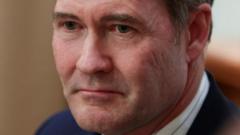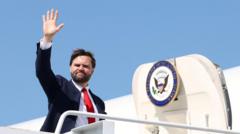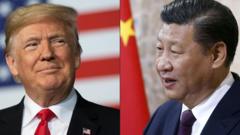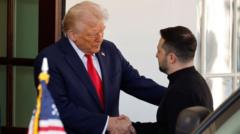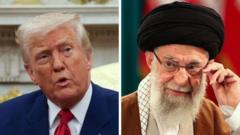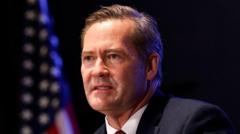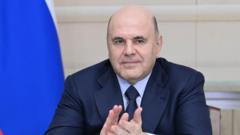In a significant move, President Trump has dismissed his national security adviser, Michael Waltz, and appointed Secretary of State Marco Rubio as his interim replacement. This personnel change marks the first major shake-up among top White House advisers during his second term, a decision Trump had sought to avoid. Waltz’s departure follows the leak of a sensitive military discussion he facilitated on the messaging app Signal, involving a journalist. His hawkish stance had been increasingly at odds with Trump's pursuit of a new nuclear deal with Iran and efforts to improve relations with Russia, leading many advisers to view him as a liability.
Trump Reshuffles National Security Leadership Amid Lingering Controversies

Trump Reshuffles National Security Leadership Amid Lingering Controversies
Former National Security Adviser Michael Waltz is removed, with Secretary of State Marco Rubio stepping in, signaling a shift in administration strategy.
Rubio will uniquely hold both roles, a situation not seen since Henry Kissinger's tenure during the Nixon and Ford administrations. The choice of a permanent national security adviser will be crucial in shaping policy towards significant global powers like China, Russia, and Iran, especially given the diverse perspectives within Trump’s current advisory team.
In related news, a fund linked to Abu Dhabi is reportedly preparing a $2 billion investment using digital currency from the Trump family’s cryptocurrency enterprise. Meanwhile, business mogul Elon Musk has publicly expressed uncertainty over his financial ambitions after the initial 100 days of Trump's presidency. The global landscape remains in flux as countries recalibrate alliances and commitments in response to Trump’s unorthodox foreign policy approaches.
As discussions about the next national security adviser progress, analysts highlight the importance of aligning U.S. foreign policy with current geopolitical realities, amidst ongoing debates about the implications of Trump's actions and decisions on both domestic and international fronts.
In related news, a fund linked to Abu Dhabi is reportedly preparing a $2 billion investment using digital currency from the Trump family’s cryptocurrency enterprise. Meanwhile, business mogul Elon Musk has publicly expressed uncertainty over his financial ambitions after the initial 100 days of Trump's presidency. The global landscape remains in flux as countries recalibrate alliances and commitments in response to Trump’s unorthodox foreign policy approaches.
As discussions about the next national security adviser progress, analysts highlight the importance of aligning U.S. foreign policy with current geopolitical realities, amidst ongoing debates about the implications of Trump's actions and decisions on both domestic and international fronts.



